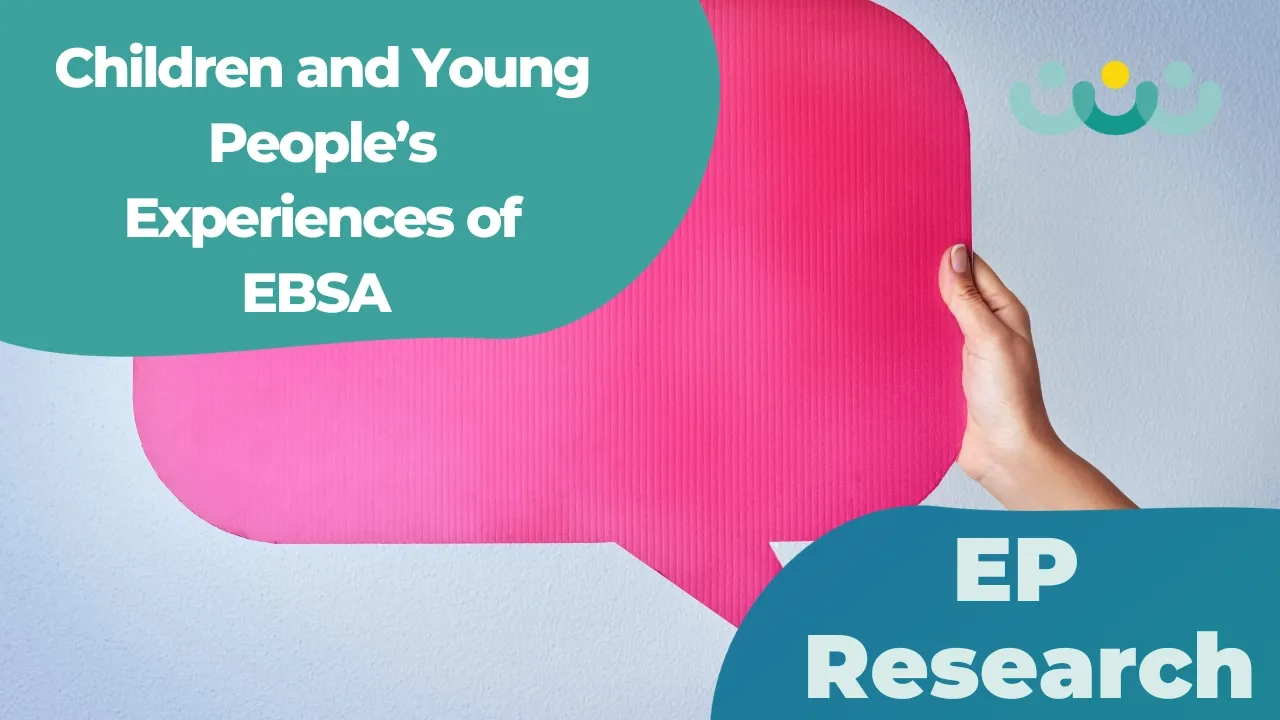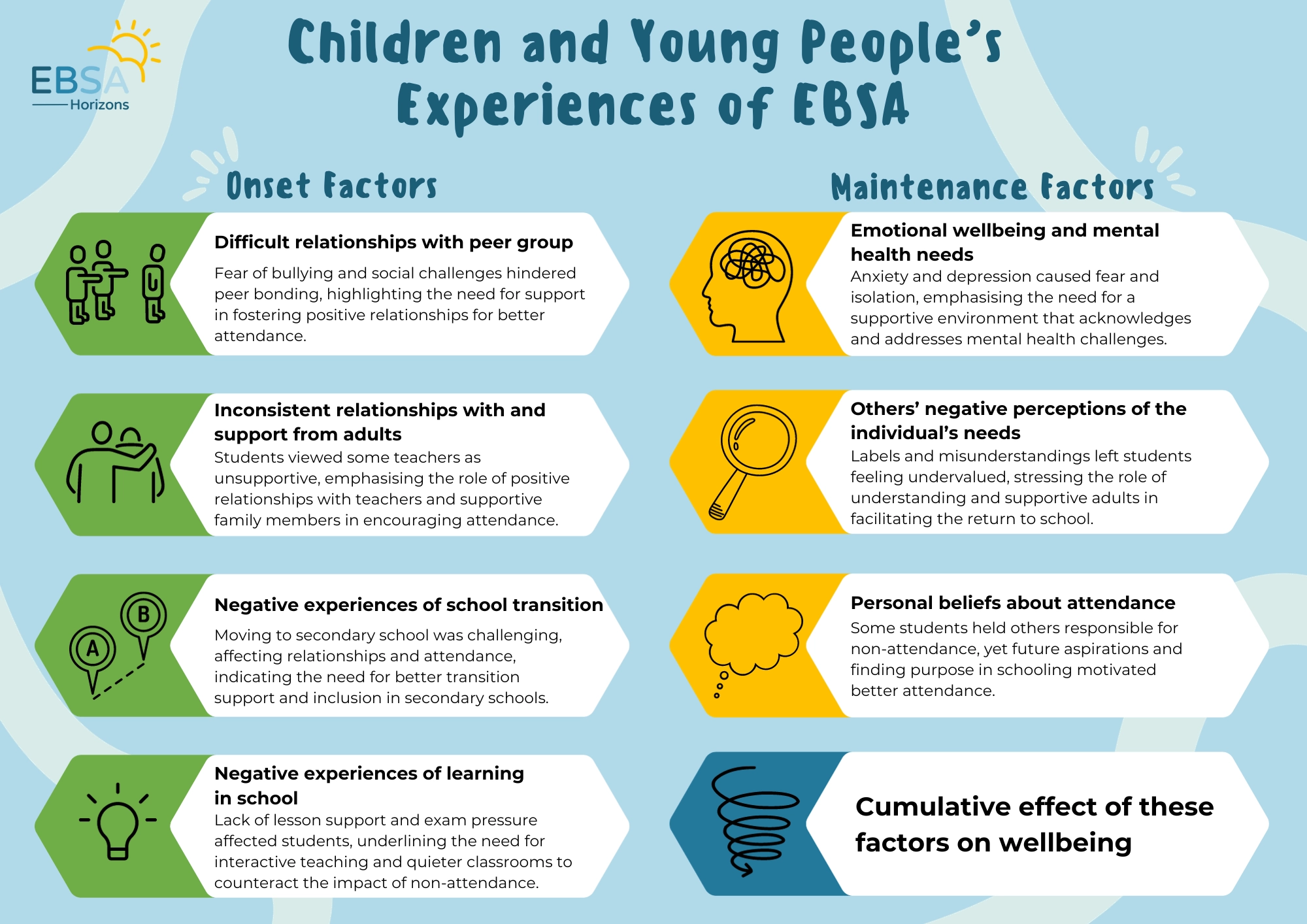Children and Young People’s Experiences of EBSA
Nov 07, 2023
by Dr Shannon Corcoran – Educational Psychologist
Effective intervention and support for school attendance difficulties requires an understanding of the perceived ‘push and pull’ factors contributing to attendance from the perspective of the child/young person who is experiencing the difficulties as well as those around them (e.g., parents/carers, key adults in school).
The following study explored children and young people’s experiences of school attendance difficulties across the UK. The views of over 60 pupils were included, resulting in the following themes:

Figure 1: Young People’s Experiences of Extended School Non-Attendance in the Literature (Corcoran and Kelly, 2022)
Factors impacting the onset of attendance difficulties
1. Difficult relationships with peer group
A sense of peer belonging was identified as very important to the young people. They identified barriers to this as being a fear of or perceived bullying and difficulties socialising, conforming to social norms, and forming friendships. This tells us that additional support to develop and maintain positive relationships within their peer group may aid regular attendance.
2. Inconsistent relationships with and support from adults
Many of the young people feared their teachers and perceived them as reluctant to provide support. The support offered was viewed as inconsistent and slow, relating to a lack of perceived validity of the young people’s needs and their often-compliant behaviour in school. Positive relationships with teachers were viewed as a protective factor and family members were also identified as ‘believing’ the young people’s needs and supporting their attendance.
3. Negative experiences of school transition
Many of the young people described their transition into a new school as a negative experience. Secondary school was a ‘hostile and unwelcoming’ environment, which felt very different to their more positive primary school experiences. Relationships with peers became more difficult at secondary school and this could be exacerbated by a loss of friendships over the transition. This suggests that a supported transition and consideration of inclusion within secondary schools will aid regular attendance at school.
4. Negative experiences of learning in school
Pupils noted a lack of support in their lessons, pressure of completing formal exams, and a perceived lack of purpose to their learning. This was mitigated through more interactive teaching approaches and quieter classroom environments. The impact of missed learning over time was also discussed, due to both non-attendance and not having their learning needs met. One suggestion within this theme is for school staff to send work home, minimising the impact of non-attendance on the young person’s attainment and progress.
5. Emotional wellbeing and mental health needs
Many young people shared that they had experienced anxiety and/or depression, prior to, or because of, their non-attendance. They described their anxiety as controlling them and held many fears about the return to school, particularly around potential bullying and staff reprimands.
Some shared that their depression was a result of not being understood by others and described feeling a need to hide their emotions. They felt isolated and noted that even whilst at school, situations of informal non-attendance, such as exclusion from lessons, increased this sense of isolation.
Factors impacting the maintenance of attendance difficulties
6. Others’ negative perceptions of the individual’s needs
Each of these experiences was identified to lead to the young people feeling ‘different’, and not valued or accepted. The young people also shared experiences of being negatively labelled due to a lack of understanding, e.g., ‘lazy’ or ‘choosing not to come in’ and being questioned upon their return regarding why they had been off. The resulting sense of shame made it harder to transition back to school after a period of absence and pupils suggested that a script to aid explanations of their absence have been helpful.
Conversely, adults who were perceived as supportive, who answered questions and who recognised the young people’s strengths were valued. These adults also gave the young people more autonomy around when to return to school.
7. Personal beliefs about attendance
Many of the young people held others responsible for their non-attendance and felt helpless to change this. Despite this, a protective factor for school attendance were the young people’s future aspirations and seeing a purpose in attending school, which motivated them to attend.
Cumulative impact of experiences over time
Many of the young people felt ‘ground down’ by the pressures of school, describing a gradual decline in their wellbeing eventually resulting in their non-attendance. They discussed the cumulative impact of their experiences over time, with each difficulty building on and worsening the next and resulting in a feeling that they had “just been off too long [to go back]”.
Sense of school belonging
The experiences described above appear to suggest that extended school non-attendance needs can arise from a reduced feeling of school belonging. The young people generally associated concepts (1) – (4) with the onset of their difficulties, while responses (5) – (7) were more typically associated with maintenance. This aligns with previous research which found that pupils were more likely to identify school-based factors as limiting their attendance compared to home-based or individual factors. Increasing pupils’ sense of safety and belonging in school is frequently recommended as an intervention approach for supporting pupils with attendance difficulties.
What can we do?
We need to unpick the factors behind pupils’ attendance difficulties to appropriately direct support and promote a sense of belonging. There are a range of tools available to do this, including discussion prompts, card sorts, questionnaires and the Checklist for Attendance tracking and Support (CATS). The research also highlights the impact of language and perceptions of pupils and suggest that practitioners should carefully consider their framing of needs in this area, avoiding terms such as ‘avoidance’ and ‘refusal’ and using pupils’ preferred terms.
These findings appear to align with the current national picture; in the recent State of the Nation 2022: children and young people’s wellbeing report (DfE, 2023), they found:
“In June 2022, 30% of children reported that they felt that they belonged at their school every day, while 41% reported feeling safe every day, and 15% reported enjoying coming to school every day. There was a strong relationship between school belonging and wellbeing.”
FOR SCHOOLS:
EBSA Horizons School Staff Training
EBSA Horizons School Training is a comprehensive CPD course for School Staff, which develops understanding and skills (alongside a lot of resources) to support children and young people experiencing difficulties attending school. This course has recently been updated with a new chapter.
Find out more about EBSA Horizons School Training here and register your interest to receive 3 FREE resources from this course.
Family Horizons: Nurturing School Engagement and Wellbeing
Family Horizons offers parents and carers on-demand access to practical strategies, knowledge, and tools across five carefully structured chapters. From understanding attendance challenges to supporting anxiety and promoting family wellbeing, the course brings together professional expertise with real family experiences.
Find out more about Family Horizons here.
FOR PROFESSIONALS:
EBSA Horizons Professionals CPD
EBSA Horizons is a comprehensive CPD course for EPs and other professionals who support schools, which develops understanding and skills (alongside a lot of resources) to support children and young people experiencing difficulties attending school. This course has been recently updated with new chapters.
Find out more about EBSA Horizons here and register your interest to receive 3 FREE resources from this course.
FOR LOCAL AUTHORITIES & MATS:
EBSA Horizons Partnership Framework
A Local Authority wide Emotionally Based School Avoidance (EBSA) initiative to improve attendance and wellbeing in schools.
Providing training and resources for all LA professionals, school staff and parents/carers.
Find out more about the EBSA Horizons Partnership Framework here.
Stay connected with news and updates!
Sign up to receive updates, resources, inspiring blogs and early access to our courses.
Don't worry, your information will not be shared.





